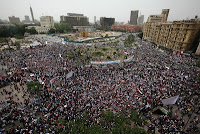The struggle goes on… and on, and on, ad infinitum

Like first-time parents (who often do not know which end the bottle goes) you could forgive the Arab revolutionaries almost anything, anything that is except giving up. That is simply not an option. Giving up now would mean at least another 40 years of virtual hibernation, isolation, cultural and social decay.
By stopping now we condemn our grandchildren to a life with blinders on, content with slurping the tasteless life-sustaining gruel poured for them into the national trough by the moneyed and powerful elite. Nose first in the trough we are deaf to the world, just like our dictators want us to be. And when someone comes along to show us a better life, we can only think of how this person threatens our source of gruel. We need to leave behind a better legacy than that.
We all cheered when certain symbols of repression were torn down, individuals like Mubarak, who we all saw as the one obstacle standing between the Egyptian people and achieving a constitutional, law-based society, free elections, and economic prosperity. We soon came to realize that the problems of that one country went far deeper and were far more complex to have all been the sole responsibility of one man. Egypt is a model for other Arab countries, as it always has been.
The army was the real source of Mubarak’s power, and the army today is faced with a choice: to hold on to power and ensure a smooth course or relinquish power and risk anarchy. This is a hard to near-impossible choice for any military man to make. Every real revolution has a period of anarchy that is so painful you almost regret starting the revolution in the first place, almost.
To borrow from the film Shawshank Redemption, Arabs have been institutionalized, except our prison has no walls or bars, just national borders and a police state that exerts such psychological terror, whether subtle or overt, that we dare not step out of line. It’s the same in every Arab country; the only difference is degree.
Even in a country like Lebanon, law is used as a tool by some to instill fear rather than comfort. It is looked upon with distrust by simple poor folk who do not view it as a source of justice for them or a source of redress of legitimate grievances, but as a tool of repression used by those in power. For the ordinary man on the street, law is rarely dispensed rapidly enough or evenly enough to have a significant positive impact.
While in some countries like the US, the judiciary is a branch of government to which the unjustly treated go to seek redress of grievances. In our Arab countries the judiciary often consists of state employees, and prosecutors often follow orders.
If from a young age we are taught that the police state is something to be feared and we can only depend on our immediate family and our expanded tribe or sect for any real assistance and help, how can we blame the revolutionaries who can’t seem to find common ground and revolutions that seem to have a decidedly sectarian or regional flavor. This is inevitable, but also correctable.
The frightening reality is one I almost dare not utter, that to build a country by the people, of the people, and for the people, we have to destroy the old one, utterly. I fear, however, that we have been so brutally institutionalized that even when given the keys to the warden’s office, we choose to meekly return to the safety and security or our cells rather than open the door and take responsibility for our own lives.
The 2005 independence revolution, which it was and which shone brightly for a very brief while, was swiftly abandoned by the people as the political and moneyed elite slowly but most assuredly took over. Independence ’05 soon became little more than an advertising slogan, usurped by one group, excluding all others. I won’t go into the details and political schisms that took place, neither will I blame the politicians who only did what comes naturally, sell us bullshit.
I blame the people who decided to turn around and go back to the warmth of their three-bedroom apartments furnished in faux-Louis style with their gaudy chandeliers, their morning subhiye, and their mindless gossip. There is no doubt the Lebanese have luxuriant prison cells, beautiful natural vistas, its hard to imagine the country as a large prison, except it is, it is one of our own making. After the brutal bloodletting of the 15-year-long civil war, we chose never to trust the other sects ever again, we chose to keep our distance, and we chose never to really mix, except in commerce and traffic.
We may readily boast that we started the Arab Spring, but we rarely admit our own cowardice in running away from the field, handing the country back to the same people who perpetuated the status quo. As for those who follow Hizbullah, I can’t really blame them, when they see the rest of us divided and bickering over crumbs, I bet they sit back and feel comfort in the knowledge that they are a cohesive people who have one solid identity and a single unwavering course. The rest of us hardly inspire confidence in a unified Lebanon.
So, to all Arab revolutionaries out there, whether carrying a gun or a pen (i.e. ipod, ipad, etc..) I leave you with this phrase in German: Und vorwärts unverdrossen! Let us go forward undaunted!



Comments
Post a Comment